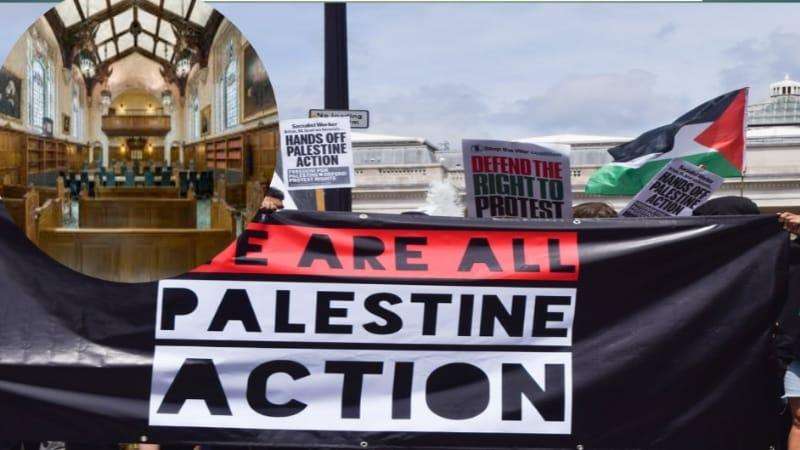The High Court has granted Palestine Action the right to challenge the Home Office's decision to proscribe the group as a terrorist organisation, in a significant ruling delivered today. This decision marks a crucial step for the pro-Palestinian direct action group, which was outlawed by the government earlier this month.
The challenge was brought by Huda Ammori, co-founder of Palestine Action, who argues that Home Secretary Yvette Cooper's decision to ban the group under anti-terrorism laws is an "unlawful interference" with fundamental freedoms. In his judgment, Mr Justice Chamberlain ruled that it was "reasonably arguable" that the proscription "amounts to a disproportionate interference" with Ms Ammori's rights to freedom of expression and assembly.
The ban, which came into force just after midnight on July 5, makes supporting Palestine Action a criminal offence, with membership or expressing support for the group punishable by up to 14 years in prison. Since the proscription, over 100 people have been arrested for allegedly showing support for the group, some merely for holding signs or wearing t-shirts. Mr Justice Chamberlain acknowledged that reports of such arrests, even for those not directly supporting Palestine Action, "have a chilling effect on those wishing to express legitimate political views."
Home Secretary Yvette Cooper cited several incidents in her decision to proscribe the group. These included an incident at RAF Brize Norton in Oxfordshire on June 20, where activists allegedly sprayed two military planes with red paint, causing an estimated £7 million worth of damage. She also referenced a protest at a weapons equipment factory in Glasgow in 2022, which reportedly caused over £1 million in damages, and the group's ongoing targeting of Elbit Systems UK, a defence technology company. Sir James Eadie KC, representing the Home Office, argued that Palestine Action's activities, by causing serious property damage, fall "squarely" within the terrorism laws' definition of acts designed to influence the government or intimidate the public.
However, the judge favoured a judicial review over the government's proposed bespoke tribunal, citing it as a faster route to address the "irreparable" restriction on speech caused by the ban. A key argument for the full legal challenge will be whether the Home Secretary had a duty to consult Palestine Action before imposing the ban, with Mr Justice Chamberlain stating it was "reasonably arguable that a duty to consult arose and reasonably arguable that there was no compelling reason why consultation could not have been undertaken here."
The UK's proscription of Palestine Action has drawn international criticism. Last week, UN Human Rights Chief Volker Türk condemned the ban as a "disturbing misuse" of counter-terror laws, urging the UK to lift it. Türk described the proscription as "disproportionate and unnecessary," raising "serious concerns that counter-terrorism laws are being applied to conduct that is not terrorist in nature." He noted that international standards typically confine terrorist acts to those intended to cause death, serious injury, or hostage-taking.
Lawyers for Ms Ammori, including Raza Husain KC, had previously described the ban as "repugnant" and "an authoritarian and blatant abuse of power," asserting that it had made the UK "an international outlier." Greenpeace UK's co-executive director, Areeba Hamid, echoed these concerns, stating: "Protests, even when they are disruptive or inconvenient, are absolutely not the same thing as terrorism. We support this decision and hope the judicial review will reveal this proscription order for the sinister and anti-democratic move it is."
The High Court had previously refused Ms Ammori's application to temporarily suspend the ban, which came into effect on July 5 after an unsuccessful last-ditch appeal. Over 80 organisations, including al-Qaeda and the Wagner group, are currently proscribed under the Terrorism Act 2000 in the UK. The full judicial review hearing could take place as early as September.








.svg)

_1.jpg)